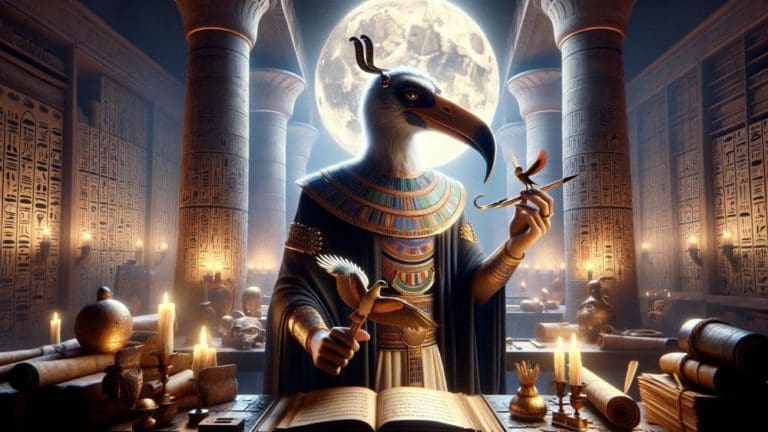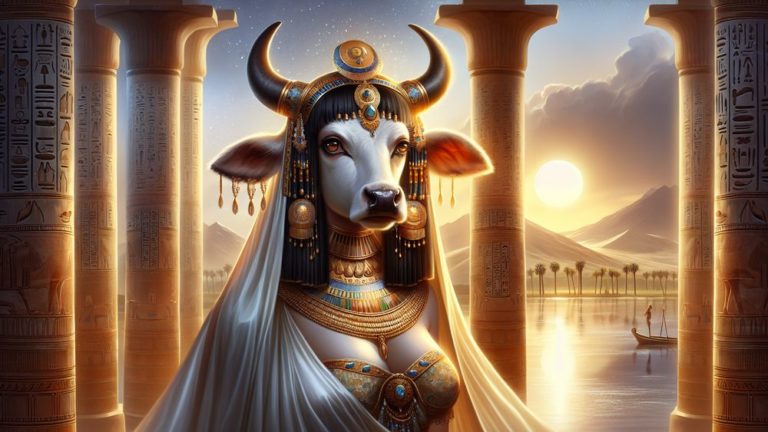Hephaestus: Greek God Of Blacksmiths, Fire, And Metalworking
Greetings, this is a look at Hephaestus, the Greek god who handles blacksmiths, fire, and metalworking. Think about a place where gods have huge powers, making the world different with their godly powers. In this place, Hephaestus becomes unique as the main maker, creating famous weapons and objects that mean a lot in many stories.
Key Points:
- Hephaestus is the Greek god of blacksmiths, fire, and metalworking.
- He was born to Zeus and Hera, but some stories say Hera had him alone.
- He fell from Olympus due to his deformity and was raised on the island of Lemnos.
- Hephaestus is known for making powerful items like Achilles‘ armor and Zeus’s thunderbolts.
- His workshop is often seen in a volcano, with helpers like Cyclopes.
- He married Aphrodite, but their relationship was troubled by her affair with Ares.
- Hephaestus’s creations have a big role in many Greek myths, showing his skill and importance.
Just like a blacksmith today changes raw metal into complex tools and art, Hephaestus uses his matchless skills to make things that even the gods admire. During this blog post, into his life and deeds, we take a look. From his rough start and bonds with other gods to his great works and long-lasting impact in arts and old stories.
If you’re new to Greek myths or very experienced, this trip will offer a full and engaging look at one of the most interesting figures in old legends.
Hephaestus: Overview and Key Facts
| Key Point | Description |
|---|---|
| Name | Hephaestus (Ἥφαιστος) |
| Domain | Blacksmithing, fire, metalworking, craftsmanship |
| Parents | Zeus (father) and Hera (mother) |
| Birthplace | Olympus (in some stories), or Hera alone (in other stories) |
| Important Locations | Olympus, the island of Lemnos, Mount Etna |
| Symbols | Hammer, anvil, tongs, and fire |
| Spouse | Aphrodite (goddess of love and beauty) |
| Well-Known Things Made | Achilles’ armor, Pandora, Hermes‘ winged helmet, Eros’s bow and arrows, the chains that held Prometheus, and many more |
| Legendary Role | Maker of godly weapons and objects, god of fire and making things, sign of both making and breaking uses of fire |
| Helpers | Cyclopes (one-eyed giants), golden robot women (automata), and other legendary creatures |
| Famous Stories | Birth and fall from Olympus, marriage to Aphrodite, making Pandora, binding Prometheus, and working with Athena |
| Shows in Art | Usually seen as a bearded man with a strong body, holding a hammer or other tools, sometimes seen with a limp or riding a donkey |
| Books Mentioning Him | Talked about in works by Homer (e.g., “Iliad” and “Odyssey”), Hesiod (e.g., “Theogony” and “Works and Days”), and other old Greek writers |
| Culture Importance | Stands for the changing power of fire and making things, showing both the helpful and harmful uses of these things in human life and old stories |
Hephaestus’s Beginnings and Early Life
To really get who Hephaestus is, we need to look into his beginnings and the early things that happened to form him to be the god of blacksmiths, fire, and metalworking.
How Hephaestus Came into the World
There are many parts to Hephaestus’s birth story, each adding a special part to his legend. Usually, people think Hephaestus is the son of Zeus, the king of the gods, and Hera, the queen of the gods. However, in some stories, Hera alone had Hephaestus, without Zeus. She wanted to have a child to rival his children’s place, Athena.
Think of a family where one parent decides to have a child alone to prove a point to the other; this shows the godly dynamics at play. No matter the story version, Hephaestus’s birth came with problems. He was born with a physical deformity, described often as a lame leg, and this made Hera throw him out of Olympus because she was ashamed.
Why Hephaestus fell from Olympus also changes in different myths. In one story, Hera threw him because of his deformity, and he landed on the island of Lemnos, where locals cared for him. Another story says Zeus threw him during a fight with Hera when Hephaestus took his mother’s side.
This act got him banished and made him fall, which left him crippled. These stories show the rocky relationships in the god family, like complex and tense relationships in human families. Through these stories, we see how Hephaestus’s early life was marked by rejection and hardship, setting the stage for his later success and strength.
Hephaestus’s birth, surrounded by various tales, involves rejection from his mother Hera and difficulties that shaped his future, highlighting complicated family dynamics among the gods.
Growing Up Hephaestus
When he was thrown out of Olympus, Hephaestus ended up on the island of Lemnos, where everything changed a lot. Think of a child who, although rejected by their family, finds a new home where they can grow. This is similar to Hephaestus’s experience on Lemnos. The people on the island, who were known for their skills in metalworking, gave Hephaestus a place to learn and improve his craft.
Here is where he began to grow his amazing talent in blacksmithing and metalworking, skills that later got him a respected place among the gods. His time on Lemnos was not just about making it through but also about changing his bad start into a base for his future greatness. The sea nymphs Thetis and Eurynome were very important in Hephaestus’s early life and took care of him.

Thetis, who later became the mother of Achilles, and Eurynome, an Oceanid, found Hephaestus after he fell and looked after him. Think of them as foster parents who provide a safe, supportive place for a child in need. They hid him in a sea cave and helped him grow his budding talents. Because of their guidance, Hephaestus’s skills got better, and he started making amazing works of art and utility.
This time in his life was key in forming his identity and abilities, laying the groundwork for his later return to Olympus and his role as the godly blacksmith.
Hephaestus’s Role in Greek Stories
Now that we’ve looked at Hephaestus’s beginnings and early life, we can now look into his big impacts and roles in Greek stories.
Master of Metal and Craft
Hephaestus is better than anyone else in making things, metalworking, and blacksmithing, and this made him the godly creator in the group of Greek gods. Think of a master creator whose works are useful and also beautiful; this is what Hephaestus’s skill means. He made the weapons and armor of the gods, such as Zeus’s thunderbolts and Achilles’ strong armor.
His skills were not only about making things that are useful but also about creating detailed jewelry and grand palaces. The importance of Hephaestus’s work in Greek stories cannot be overstated; his creations were key to the gods’ strength and impact, appearing as the perfect blend of form and function. With his unequaled skill in making things, Hephaestus not only served the gods but also left a lasting mark on the mythological world.
Inside Hephaestus’s Workshop
Hephaestus’s famous workshop was an amazing piece of godly work, often shown inside the heart of a volcano like Mount Etna. Picture a modern high-tech lab with advanced tools and helpers, and you get an idea of Hephaestus’s area. In his workshop, there were not only the best tools but also mythical creatures like the Cyclopes, who were expert blacksmiths. These helpers assisted Hephaestus in making some of the most well-known items in Greek stories. His famous creations include:
- Achilles’ Armor: A set of almost unbeatable armor that was very important in the Trojan War.
- Pandora: The first woman, made from clay, who let out both good and bad things into the world.
- Zeus’s Thunderbolts: The strong weapons used by Zeus to keep his rule over everything.
- Helios’s Chariot: The golden chariot that took the sun god across the sky each day.
With these great works, Hephaestus’s workshop stood as a symbol of unmatched skill and godly cleverness.

Hephaestus and the Power of Fire
The fact that Hephaestus is connected to fire shows his two sides as both a maker and a breaker. Consider fire as a tool that can cook a meal and give food and heat. But it can also burn down a house and cause chaos. This two-sided nature perfectly fits Hephaestus’s role in stories.
He used fire’s creative power to make great weapons, armor, and things for the gods and heroes. Yet, fire’s destroying side was always there, meaning the wild and unpredictable parts of who he was. Fire here means Hephaestus himself – able to create a lot and also able to destroy, and showing the fine line between these opposing forces.
Hephaestus symbolizes the dual nature of fire, representing both his ability to create valuable items and the potential for destruction that lies within him.
Hephaestus’s Connections and Relationships
After we’ve looked at Hephaestus’s skills and his connection to fire, now we see his dealings and relationships with other gods and figures in Greek mythology.
Married Life with Aphrodite
Hephaestus and Aphrodite’s marriage is one of the most interesting in Greek myths, often compared to a talented craftsman marrying someone very beautiful. Hephaestus, the god of blacksmithing and making things, was paired with Aphrodite, the goddess of love and beauty, in a match set up by Zeus. This marriage was not about love but was a tactical decision to avoid fights among the gods, who all admired Aphrodite’s beauty.
Even though Hephaestus was very devoted and tried to make her happy with great creations, their marriage had many problems because they had different interests and personalities. Yet, the dynamics of their relationship got more complicated due to Aphrodite’s cheating with Ares, the god of war.
This affair is one of the most well-known stories in Greek myths, showing the tension and issues in their marriage. Hephaestus found out about the affair and made a fine, nearly invisible net to catch them. He then exposed them to the other gods, looking for both justice and humiliation for their betrayal.
This story highlights the complexities of their relationship and means Hephaestus’s smart thinking and the dramatic mix of love, jealousy, and revenge among the gods.
Hephaestus and Athena’s Bond
Hephaestus and Athena have an interesting bond that mixes making things and intelligence, much like an engineer working with a strategist. One of the well-known myths about them is the story of Erichthonius, a famous king of Athens. In the story, Hephaestus tried to win over Athena, but she said no.
Because of this, Hephaestus’s seed fell on the ground, and Erichthonius was born from it. Athena saw the child’s potential and decided to raise him. This shows how their skills work well together – Hephaestus’s skill in making things and Athena’s smartness to guide and teach.

Their bond means the union of practical skill and intellectual prowess, which was valued in ancient Greek times and added a lot to the stories of Athens as a place of both new ideas and wisdom.
Hephaestus and His Fellow Gods
Hephaestus’s dealings with other gods are like the complicated relationships in a big family or office, where each person has distinct roles and different personalities. His bond with Zeus, his father, is complicated. Zeus, the leader of the gods, often counted on Hephaestus’s skills to make strong artifacts, like the thunderbolts that Zeus himself used. But their relationship wasn’t without problems.
Hephaestus was thrown from Olympus, some stories say, because of Zeus’s anger. Hera, Hephaestus’s mother, also had a tricky bond with him. Some tales say she cast him out of Olympus because of his physical appearance, only to later seek his help in making beautiful and powerful items. Dionysus, the god of wine and revelry, was important in getting Hephaestus back to Olympus.
Stories say Dionysus became friends with Hephaestus and, by persuading and getting him drunk, convinced him to come back to the gods.

Key myths that refer to these bonds include:
- Zeus and the Thunderbolts: Hephaestus made the thunderbolts that Zeus used as his main weapon, showing the trust and reliance Zeus had on Hephaestus’s abilities.
- Hera and the Golden Throne: In one tale, Hephaestus made a golden throne which trapped Hera when she sat on it, as a way to get back at her for throwing him out. This forced the gods to negotiate his return to Olympus.
- Dionysus and the Return: Dionysus’s friendship with Hephaestus is celebrated in the story where he convinces Hephaestus to come back to Olympus, often shown as a merry procession where Dionysus uses wine to ease Hephaestus’s hesitation.
These dealings not only mean Hephaestus’s key role among the gods but also point to the intricate and often challenging relationships within the Greek pantheon.
Hephaestus’s Works and Creations
We’ve talked about Hephaestus’s relationships with other gods. Now, let’s look at his amazing creations that mean he is very good at making things.
Notable Creations
Hephaestus’s creations are famous, like the well-known inventions of Leonardo da Vinci or Thomas Edison. Each item made by Hephaestus not only was useful but also had a big role in myths. For example, Hermes’ winged helmet and sandals let the messenger god move quickly between the human and divine worlds.
Similarly, Eros’s bow and arrows, able to make anyone fall in love, show how much Hephaestus’s work affected gods and humans. Another famous creation is the chains of Prometheus, used to punish Prometheus for giving fire to people. These chains could not be broken, meaning the unchangeable nature of divine punishment.
Below is a table listing some of Hephaestus’s best creations, with their descriptions and importance:
| Creation | Description | Importance |
|---|---|---|
| Hermes’ Winged Helmet | A helmet with wings letting Hermes fly. | Let Hermes move fast, meaning speed and communication. |
| Eros’s Bow and Arrows | A bow and arrows making anyone fall in love. | Represented love and desire, impacting both gods and humans. |
| Chains of Prometheus | Unbreakable chains binding Prometheus to a rock. | Meant divine punishment and consequences of defying Zeus. |
| Achilles’ Armor | Strong armor giving Achilles near invincibility. | Showed Hephaestus’s great skill in making protective gear. |
| Pandora | The first woman, made by Hephaestus, who let out evils into world. | Demonstrated Hephaestus’s role in key mythological events. |
These items not only display Hephaestus’s matchless skill in crafting but also play important roles in different myths, reflecting the big influence of his work on Greek stories.
Hephaestus’s Mechanical Marvels
Hephaestus’s mechanical wonders, like modern robots or AI, were new and very useful. Some of his best-known mechanical people were the golden handmaidens, made to help him in his workshop. These handmaidens could do hard tasks and were given smarts and speech, making them early examples of fake life. Talos, another amazing thing, was a bronze giant who protected the island of Crete.

Talos was made to guard the island’s shores and throw large stones at ships coming near. He was a strong protector. These creations mean Hephaestus’s great ability to mix art and technology, and they show his role as an early innovator in Greek stories.
Hephaestus created remarkable machines, like the golden handmaidens and Talos, showcasing his skill in blending art and technology as an early innovator.
Hephaestus in Art and Stories
After looking at Hephaestus’s amazing things, we can now focus on how he is drawn in old art and tales.
Ancient Art Showcasing Hephaestus
Ancient Greek art often shows Hephaestus as a strong, bearded man. Sometimes he has a limp, which means his mythological lameness. Sculptures often mean him holding a hammer or tongs, tools that stand for his role as the god of blacksmiths and craftsmen. On pottery, Hephaestus appears working at his forge, surrounded by his tools, just like how a modern-day inventor might be in a workshop filled with gadgets.
One important example is the François Vase, a large pot that shows Hephaestus going back to Olympus on a donkey. This scene highlights his special place among the gods. Also, on the east frieze of the Parthenon, there is an image of Hephaestus, which highlights his importance among the gods.
These artworks do not just mean Hephaestus’s skill but also give us valuable views into how the ancient Greeks saw this complex god.
Hephaestus in Old Writings
Hephaestus often appears in old Greek writings, especially in the works of Homer and Hesiod. In Homer’s “Iliad,” Hephaestus is the god blacksmith who makes great armor for Achilles, which means his amazing skill. In the “Odyssey,” Hephaestus’s clever side is seen in the story where he traps his unfaithful wife, Aphrodite, and her lover, Ares, in a finely made net.

Hesiod’s “Theogony” talks about where Hephaestus came from and his place among the gods, saying he is both creative and hardworking. Since these stories describe Hephaestus in detail, they help us understand him better. They show Hephaestus as a god who is both strong, like a blacksmith, and smart, like an inventor.
Pantheon of All Greek Gods
To really get Hephaestus’s place in Greek myths, you need to know about the Greek gods in general. This complex group of gods, each having their own special areas and tales, creates a rich mix of mythical stories. For a full summary, you can look at this complete list with all Greek Gods.
FAQs
1. Who were Hephaestus’s parents?
Hephaestus’s parents were the Olympian gods Zeus and Hera.
2. What are some of Hephaestus’s most famous creations?
Some of Hephaestus’s most famous creations include the armor of Achilles and the first woman, Pandora.
3. How is Hephaestus associated with fire?
Hephaestus is associated with fire as it symbolizes both his role as a blacksmith and his dual nature of creation and destruction in mythology.
4. What is the significance of Hephaestus’s marriage to Aphrodite?
The significance of Hephaestus’s marriage to Aphrodite lies in the contrast between his craftsmanship and her beauty, highlighting themes of love, betrayal, and the complexities of divine relationships in Greek mythology.







